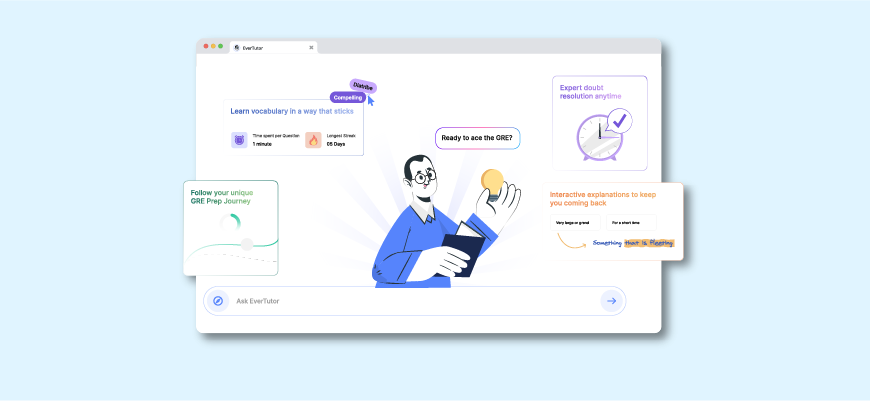Preparing for the Graduate Record Examination (GRE) can feel overwhelming, but you don't have to go it alone.
Whether you’re hunting for graduate record exam practice test resources or a mock GRE exam, consistent practice is your key to success. This guide covers everything: why practice tests matter, detailed section-by-section tips (Analytical Writing, Verbal, Quant), and plenty of sample questions with explanations.
We’ll also share actionable study strategies, common pitfalls to avoid, and how EverTutor’s AI-driven tutoring can give you an edge. With this comprehensive approach (and a few practice tests under your belt), you’ll build confidence and sharpen the skills needed for every GRE section.


Taking full-length GRE practice tests is one of the most effective ways to boost your score and confidence. Practice exams simulate the real test environment, helping you build stamina and get comfortable with the format and timing. More importantly, they turn studying into active learning.
In fact, research shows that practice tests implement spaced retrieval practice, meaning you pull information from memory and thereby strengthen it. One study found that students who took practice exams scored, on average, about 15–25 percentage points higher on the final test than those who didn’t.
In short, practice tests don’t just assess your knowledge- they improve it.
In a mock GRE exam, you’ll often be surprised by what you know (and don’t know). For example, many students find that vocabulary and endurance are weak spots only after experiencing the full test. Use each practice test as a learning tool: when you finish, review every question you missed or guessed on. Over time, these insights compound – turning practice into higher scores.
To prepare effectively, first understand the structure of the GRE.
The test has three main parts: Analytical Writing, Verbal Reasoning, and Quantitative Reasoning.

In the Analytical Writing section, you’ll analyze a prompt and write a clear, organized essay. Since it’s now one 30-minute task, make every minute count.
There are two types of tasks (though currently usually one): Issue (state your opinion on a statement) or Argument (critique someone’s reasoning). Regardless, the goal is the same: craft a well-structured, coherent argument.
Sample Analytical Writing Prompt:
“As people rely more and more on technology to solve problems, the ability of humans to think for themselves will surely deteriorate.”
To tackle this, pick a clear position (e.g. disagree strongly). Outline your reasoning: maybe technology can enhance thinking by giving us tools (so people use higher-level thinking), or it can erode certain skills (like mental arithmetic). Writing practice essays on different prompts (and getting feedback) is the best way to refine your approach.
Tips for Analytical Writing:

The Verbal section tests your ability to understand and analyze written material through Reading Comprehension, Text Completion, and Sentence Equivalence.
Each question requires different skills, such as vocabulary, inference, and reasoning.
Text completion questions assess your ability to fill in missing words within a passage, testing both your vocabulary and ability to infer meaning from context.
Sample Question:
"Increased globalization has led to the spread of technology across borders, with some countries experiencing significant (i) _______ in productivity, while others have struggled to (ii) _______ the same level of economic growth."
Answer:
(i) B) increases, (ii) A) sustain
Explanation: The context implies a positive development in productivity in some countries and a struggle for others to maintain growth. "Increases" fits for the first blank, and "sustain" fits for the second blank.
Tips for Solving Text Completion:
Sentence Equivalence questions test your ability to understand sentence meaning and select the best pair of words that produce a coherent sentence.
Sample Question:
"The lawyer’s argument was so (i) _______ that it left the judge speechless, as it addressed every issue raised in the case in a meticulous and (ii) _______ manner."
Answer:
(i) B) persuasive, (ii) A) elaborate
Explanation: The sentence implies that the lawyer’s argument impressed the judge. "Persuasive" fits for the first blank, and "elaborate" describes a detailed manner of addressing issues.
Tips for Solving Sentence Equivalence:
Reading Comprehension questions assess your ability to analyze and understand written material.
Sample Question:
"While the effects of climate change are becoming more pronounced, the debate over its causes remains unresolved. Some argue that human activity is the primary driver, citing the increase in CO2 emissions since the industrial revolution. Others contend that natural cycles are at play, and the rise in temperature is part of a larger, inevitable trend."
Question:
The author mentions the debate over climate change primarily to:
A) Explain why climate change is an important issue.
B) Present differing viewpoints on the causes of climate change.
C) Discuss the scientific evidence supporting the theory of human-induced climate change.
D) Emphasize the inevitability of global warming.
Answer:
B) Present differing viewpoints on the causes of climate change.
Explanation: The passage presents two viewpoints regarding the causes of climate change, making option B the best answer.
Tips for Solving Reading Comprehension:

Quantitative Reasoning questions test your ability to solve mathematical problems, such as arithmetic, algebra, geometry, and data analysis. The key is to practice a wide range of problems to strengthen your skills.
This question type tests your ability to apply arithmetic concepts to solve word problems.
Sample Question:
A car travels 150 miles on 5 gallons of gas. How many miles per gallon does the car get?
Answer:
30 miles per gallon
Explanation:
To solve, divide the distance traveled by the number of gallons of gas used:
150 miles ÷ 5 gallons = 30 miles per gallon.
Tips for Solving Arithmetic Questions:
This format tests your ability to solve equations and inequalities.
Sample Question:
Solve for x: 2x + 5 = 15
Answer:
x = 5
Explanation:
To solve for x, subtract 5 from both sides of the equation:
2x = 10.
Then, divide both sides by 2:
x = 5.
Tips for Solving Algebra Questions:
Data interpretation questions present charts, tables, or graphs, requiring you to interpret and analyze data.
Sample Question:
A graph shows the sales of a company over 5 years. In year 1, the sales were $500,000; in year 2, sales increased by 10%. In year 3, sales decreased by 5%. What were the sales in year 3?
Answer:
Year 1: $500,000
Year 2: $500,000 * 1.10 = $550,000
Year 3: $550,000 * 0.95 = $522,500
Explanation:
To find the sales in year 3, we first calculate the 10% increase in year 2, then apply the 5% decrease in year 3.
Tips for Solving Data Interpretation:
Use EverTutor for practice: EverTutor’s data interpretation exercises can help you get comfortable with graphs and tables, explaining how to read and analyze them quickly and accurately.

By being aware of these mistakes, you can take proactive steps to avoid them. For instance, schedule time after each practice test to thoroughly review errors- this “learning from mistakes” approach is exactly what experts recommend.

Many test-takers find success by combining regular practice with personalized tutoring. EverTutor is designed for that. It’s an AI-powered interactive tutor, personalized to your learning style. Imagine having a tutor that communicates with you through chat- that’s EverTutor. Here’s how it helps:
In short, EverTutor complements your practice test routine. By combining extensive practice questions with AI guidance, it helps turn each study session into a dialogue- keeping you engaged and on track.
Preparing for the GRE can be an intense but rewarding process. By breaking down each section and practicing regularly, you’ll gain the skills and confidence necessary to succeed. Whether you're focusing on Analytical Writing, Verbal Reasoning, or Quantitative Reasoning, the key is consistent practice, review, and effective use of available resources. Remember, practice tests are not just about assessing what you know- they help you improve, strengthen your weak areas, and familiarize yourself with the test format.
EverTutor’s personalized tutoring and practice tools can further enhance your preparation by offering tailored feedback and interactive learning. By leveraging both study strategies and high-quality resources, you'll be better equipped to reach your target GRE score. Stay focused, stay positive, and keep moving forward. Good luck, and we believe you have what it takes to succeed on your GRE journey!
Start by taking a diagnostic test to understand your baseline score and identify strengths and weaknesses. Then, build a study schedule that includes consistent practice, content review, and test-taking strategies. Break down each section (Analytical Writing, Verbal Reasoning, and Quantitative Reasoning) and focus on one area at a time.
It’s recommended to take 4–6 full-length practice tests before the real exam. Start early with a diagnostic test, then plan to take one every 1–2 weeks, with the last one being within a week of your test date. This helps track progress and ensures you're familiar with the test’s pacing.
You are allowed to use an on-screen calculator for the Quantitative Reasoning section. However, you cannot bring your own calculator. The on-screen calculator is available only for certain questions, so you will need to rely on your math skills and scratch paper for other questions.
Absolutely! EverTutor provides targeted practice for all sections of the GRE, including Analytical Writing, Verbal Reasoning, and Quantitative Reasoning. Whether you're struggling with sentence completion in Verbal or need help with math concepts, EverTutor adapts to your needs and gives instant, personalized feedback.
✅ 1000+ Practice Questions with Step -by-Step AI Walkthroughs.
✅ Vocabulary Trainer for the most essential GRE words.
✅ 24/7 Real-Time Doubt Solving with an AI Tutor.
✅ 5 Full-Length GRE Mock Tests with instant AWA scoring.